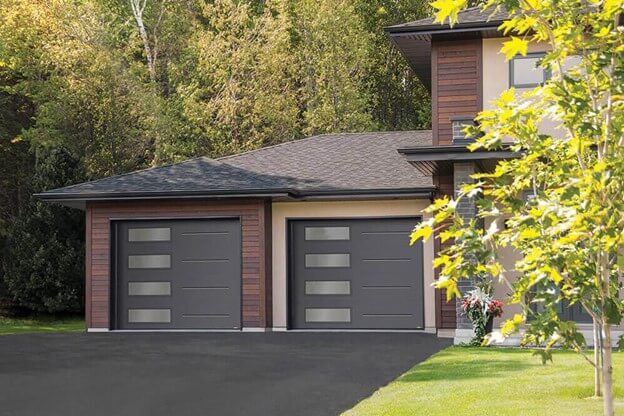PVC garage doors are a popular choice among homeowners for their durability, low maintenance, and affordability. But like any building material, PVC has its own set of pros and cons. In this article, we’ll take a closer look at the benefits and drawbacks of PVC garage doors to help you decide if they’re the right fit for your home.
Pros of PVC Garage Doors:
- Low Maintenance: PVC is a plastic material that is resistant to rot, rust, and decay. This means that PVC garage doors require very little maintenance to keep them looking and functioning like new. Unlike wooden doors, PVC garage doors do not need to be painted or stained, and they won’t warp or rot over time.
- Durability: PVC garage doors are built to withstand the elements and the wear and tear of daily use. They’re resistant to dents and scratches, and they won’t rust or corrode like metal doors. They are also resistant to fire, termites and other forms of pests, which makes them an ideal option for homeowners in areas prone to natural disasters or pests.
- Affordability: PVC garage doors are generally less expensive than other types of garage doors, such as wood or metal. This makes them an attractive option for homeowners on a budget who want a durable and low-maintenance door without breaking the bank.
- Variety: PVC garage doors come in a wide range of styles and colors, so you can easily find one that matches the aesthetic of your home. Some manufacturers also offer the option of adding decorative elements, such as windows or hardware, to give your door a more custom look.
- Energy Efficiency: PVC garage doors are made with a foam core that provides excellent insulation, which helps to keep your garage and your home more energy efficient. This can help you save money on your energy bills and make your home more comfortable year-round.
Cons of PVC Garage Doors:
- Limited Customization: While PVC garage doors come in a variety of styles and colors, they may not offer the same level of customization as other types of doors. For example, some homeowners may prefer the look and feel of a wood door, which may not be available in PVC.
- Not as Strong as Wood or Metal: PVC garage doors are not as strong as wood or metal doors, which means they may not be the best choice for homes that experience a lot of heavy traffic. This is especially true if you have a larger garage or if you use your garage to store heavy equipment or vehicles.
- Limited life Span: PVC garage doors have a limited lifespan and are not as durable as wood or metal doors. They will last for around 15-20 years on average, while wooden and metal doors can last up to 30 years or more.
- UV Damage: PVC can be affected by UV rays and may fade or yellow over time. This can be a problem for homeowners who live in areas with high sun exposure, as the color of their garage door may not look as good as it did when it was first installed.
- Not Environmentally friendly: PVC is not environmentally friendly and its production process is not sustainable. It is made of petroleum and chlorine, which are not renewable resources and also, PVC is not biodegradable which can have a negative impact on the environment.
In conclusion, PVC garage doors are a popular choice among homeowners for their durability, low maintenance, and affordability. They come in a wide range of styles and colors, and they provide excellent insulation to help keep your home energy efficient. However, they are not as strong as wood or metal doors, and they have a limited lifespan.




